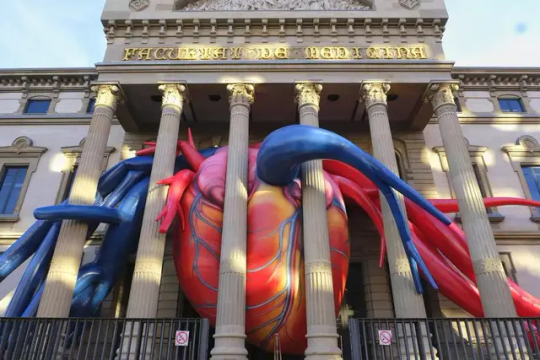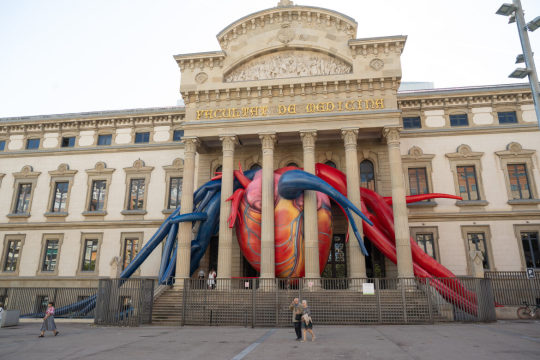#Medicine
Text
Scientists at UC Riverside have demonstrated a new, RNA-based vaccine strategy that is effective against any strain of a virus and can be used safely even by babies or the immunocompromised.
Every year, researchers try to predict the four influenza strains that are most likely to be prevalent during the upcoming flu season. And every year, people line up to get their updated vaccine, hoping the researchers formulated the shot correctly.
The same is true of COVID vaccines, which have been reformulated to target sub-variants of the most prevalent strains circulating in the U.S.
This new strategy would eliminate the need to create all these different shots, because it targets a part of the viral genome that is common to all strains of a virus. The vaccine, how it works, and a demonstration of its efficacy in mice is described in a paper published today in the Proceedings of the National Academy of Sciences.
“What I want to emphasize about this vaccine strategy is that it is broad,” said UCR virologist and paper author Rong Hai. “It is broadly applicable to any number of viruses, broadly effective against any variant of a virus, and safe for a broad spectrum of people. This could be the universal vaccine that we have been looking for.”
Continue Reading.
13K notes
·
View notes
Text


april 21 2024
I started running (I’ve never been a runner idk I play tennis pretty avidly and can play for like 3 hours straight but running is almost impossible) but I’m doing it as a mental health challenge ;_; the way medical school affects me is so different from everything prior. like I do think there is less to “do” compared to undergrad, but there’s more “pressure” to basically not mess up because you’ve come too far to fail LOL so that really gets to me sometimes. The running seems to help me balance my mental (and I’ve been running for ~20 min every morning for the past week - I’m already feeling a difference and that excites me!!)
hope you are all doing well~
instagram: @ stemcellee
#studyblr#study#studyspo#college#studying#notes#note taking#studyspiration#science#life#med school#medical school#med student#medical student#aesthetics#aesthetic#premed#cozy#medicine#medblr
87 notes
·
View notes
Text
https://tammy-875.ludgu.top/i/IC71QJK
#taylurking#deep#zombie#mike pence#kaeya#armie hammer#siwon#kacey musgraves#kipo#jennie#medicine#pokemon#joseph gordon levitt
129 notes
·
View notes
Text
#tom daley#sai#ariadna majewska#thor ragnarok#Doggerland#oli sykes#netflix#sandals#taylurking#siwon#medicine#wetgirl
130 notes
·
View notes
Text
#vegebul#taylurking#deep#mike pence#armie hammer#medicine#old xian#spilled thoughts#barry allen#custom noods#bruce lee#hemlock grove#size difference
126 notes
·
View notes
Photo

Germ Theory
The Germ Theory, which emerged in the late 19th century, demonstrated that microscopic germs caused most human infectious diseases. The germs involved included bacteria, viruses, fungi, protozoa, and prions. Louis Pasteur (1822-1895), a French chemist and microbiologist, and Robert Koch (1843-1910), a German physician and microbiologist, are credited with the discovery of the germ theory in the 1860s-1880s.
Regarded as the most important discovery in the history of medicine, the germ theory challenged the medical profession to reevaluate how disease was thought about, offered possibilities for both the prevention and treatment of disease, as well as the discovery and implementation of new technologies to combat disease.
Previously, doctors assumed that disease was an internal process of the human body especially Hippocrates' long-standing four humors theory notion that excesses or deficiencies of four bodily fluids (blood, phlegm, yellow and black biles) led to illness and disease. The germ theory contradicted that idea by separating the disease from the afflicted persons. Furthermore, the new theory ushered in a regimented way of classifying diseases (nosology) according to the type of microorganisms causing the disease.
Historical Theories of Disease
Prior to the discovery of the germ theory, various theories were advanced as possible explanations for illness and disease in humans. The earliest theory was the miasma theory attributed to Hippocrates (460-370 BCE), a Greek physician. Derived from the Greek word meaning pollution or "bad air", the miasma theory suggested that decomposing particles from organic materials, plants or animals, poisoned the air. Although easily detected by smell, people who inhaled the "bad air" would become ill. Additionally, planetary movements, disturbances to the Earth, poor hygiene, and polluted water often contributed to miasma. Attempts to remove waste along with cleanliness were thought necessary to improve the atmosphere to avoid infection and disease.
Aristotle (384-322 BCE), a Greek philosopher, offered the spontaneous generation of disease. It was possible, Aristotle thought, for living organisms to spring from non-living matter. Furthermore, this process, like maggots appearing from dead flesh, was a regular and natural phenomenon.
Galen (129-216 CE), a Roman physician, extended Hippocrates' earlier speculation about the imbalance of bodily fluids as the cause of disease. Galen attached each of the four humors to a particular season characterized by hot, cold, dry, and wet. For example, colds and flues occurred most often during cold and wet weather. Any change in the weather or season could upset the balance of the four humors so treatments were devised to restore said balance e.g., purges, bloodletting, enemas, and vomits. These ancient theories dominated Western medical thinking about illness until the 19th century.
Another theory of the origin of diseases referred to supernatural causes. A person's sins resulted in contracting a disease or illness as a punishment from the gods or God. Ghosts, demons, and evil spirits also possessed the ability to afflict a person with illness. Magic, divination, spells, exorcism, and various drugs were used to diagnose and treat illness. It fell to a variety of healers – shamans, priests, diviners, medicine men – to drive away the evil spirits. Illness as a punishment for sins, as well as a test of faith, was later offered by Christian theologians as an explanation for disease.
Additional theories on the origin of diseases continued to emerge. Girolamo Fracastoro (1476-1553), an Italian physician, is credited with first using the word "contagion" when describing the transmission of illness. His "seeds of disease" theory argued that disease could be spread by direct or indirect contact or over long distances through no contact at all. A German chemist, Justus von Liebig (1803-1873), one of the early founders of organic chemistry, suggested that as a result of a chemical process from decaying organic matter, disease simply emerged in the blood (the body's "chemical factory").
Continue reading...
30 notes
·
View notes
Text
Quebec appears to be winning its battle against the rising tide of measles after 45 cases were confirmed province-wide this year.
"We've had no locally transmitted measles cases since March 25, so that's good news," said Dr. Paul Le Guerrier, responsible for immunization for Montreal Public Health.
There are 17 patients with measles in Quebec currently, and the most recent case is somebody who was infected while abroad, he said.
But it was no small task to get to this point.
Continue Reading.
Tagging: @newsfromstolenland
47 notes
·
View notes
Text


People keep asking me which specialty I want to choose after graduating med school and I still have no clue :‘(
#studyblr#studying#inspiration#productivity#university#studyspo#med school#medicine#new semester#med school struggles#german med school#starbucks#coffee shop#feminist art
44 notes
·
View notes
Text

Gee, I thought these people were the ones who were like “If you don’t like it, you can just move to a blue state.”
And now they’re mad the guy is doing just that?
You can’t oppress and discriminate against someone then be mad when they take their highly useful skill elsewhere.
#lgbtq#news#louisiana#democrats#republicans#politics#healthcare#Nbc#nbc news#transgender#medicine#ron desantis
87K notes
·
View notes
Text
Researchers have discovered that leaky blood vessels, together with a hyperactive immune system may be the underlying cause of brain fog in people with long covid.
They suggest their discovery is important for the understanding of brain fog and cognitive decline – difficulty with thinking, memory or concentration – seen in some people with the condition.
It is hoped the findings will help with the development of treatments in the future.
To Summarize:
Long Covid sufferers experience symptoms like forgetfulness and concentration issues due to leakiness in brain blood vessels, according to research findings.
Scientists from Trinity College Dublin and FutureNeuro confirm that Long Covid patients with brain fog have disrupted blood vessels in their brains, making the neurological symptoms measurable.
Blood vessel leakage in the brain, along with an overactive immune system, may be the key drivers of brain fog in Long Covid patients, leading to potential changes in understanding and treating post-viral conditions.
I can't find a single right-wing news source covering this.
23K notes
·
View notes
Text
Some people have genes that make them naturally stronger, according to a largest-of-its-kind study of more than 340,000 people in Finland.
In addition to having a solid foundation for building brawn, individuals with the highest predisposition to hand grip strength were found to have up to 23 percent lower risk of common diseases, and a longer life expectancy.
The study's findings suggest that personalised genetic details on muscle strength and weakness can help doctors identify who is at risk of certain health conditions.
Continue Reading.
43 notes
·
View notes
Text
yes, doctors suck, but also "the medical ethics and patient interaction training doctors receive reinforces ableism" and "the hyper competitive medical school application process roots out the poor, the disabled, and those who would diversify the field" and "anti-establishment sentiment gets applications rejected and promotions requests denied, weeding out the doctors on our side" and "the gruesome nature of the job and the complete lack of mental health support for medical practitioners breeds apathy towards patients" and "insurance companies often define treatment solely on a cost-analysis basis" and "doctors take on such overwhelming student loan debt they have no choice but to pursue high paying jobs at the expense of their morals" are all also true
none of this absolves doctors of the truly horrendous things they say and do to patients, but it's important to acknowledge that rather than every doctor being coincidentally a bad person, there is something specific about this field and career path that gives rise to such high prevalence of ableist attitudes
and I WILL elaborate happily
#theres so much that contributes to this#and its such a traditional field that any change takes ten years to take effect even when its not as controversial as disability rights#ive no lost love for doctors as a whole#but the deeper causes here need to be examined to understand how this problem manifested and what can be done to fix it#disability#chronic illness#ableism#premed#medicine#salt baby talks
19K notes
·
View notes
Note
Sorry I'm kind of dissociated and my vocab crashes during that can you explain the Biden drug thing in just. Shorter simple sentences.
Sure! You're not the only one who's mentioned being unclear on what it means either, and I'm happy to help
(Context for anyone else: US Sets Policy to Seize Patents of Government-Funded Drugs if Price Deemed Too High, via Good News Network, December 11, 2023)
From the very basics:
When drug companies create new drugs, they get a legal protection called a "patent." The patent means no one else can make or sell the same drug for whatever number of years.
Usually, this is about 10 years after the drug starts being sold to the public.
So, for those years, that one drug company is the only source of whatever medication. And since people need their medication, drug companies can charge however much money they want.
Meaning a lot of drugs that people need to live cost way too much money to buy.
So, with this, Biden told drug companies "Fuck you, if you keep making medicine too $$$ for people to afford, I'm giving your competition the right to make and sell those drugs too."
The US has never done anything like this before.
This is a huge threat to the whole (awful) drug industry in the US. It will save people thousands of dollars. If he does this, it will save lives.
--
Edit 12/17/23: Quick note, as people have said in the notes, this only applies to drugs made in part using taxpayer money. Which is! Literally all of them!
#Anonymous#prescription drugs#medicine#public health#biden#biden administration#united states#us politics#ask#me#good news#hope
13K notes
·
View notes
Text


The University of Barcelona's Medicine Faculty has temporarily installed a giant heart made by the Catalan artist Jaume Plensa, with the building's columns acting as the ribcage.
The objective of this work of art is to raise awareness about cardiovascular illnesses, which are the leading cause of death worldwide.
The work is titled El cor secret (The Secret Heart). The heart measures 13 metres tall and 10 metres wide, and weighs 150 kg. It's made of synthetic materials and painted by hand. It had previously been shown in Germany in 2014 and was supposed to arrive to Plensa's home city sooner, but it was delayed because of covid. Instead, in 2020, Plensa donated one of his famous head sculptures to this same building, to thank medicine professionals and students for their work during the pandemic.
#jaume plensa#arts#barcelona#catalunya#heart#university#cardiovascular#medicine#med school#modern art#contemporary art#artist#arts and crafts#dark academia
12K notes
·
View notes
Text
It’s insane how many organs will just Make Rocks if left up to their own devices. Kidneys. Gall bladder. Pancreas. Tonsils, what’s that about???
147K notes
·
View notes
